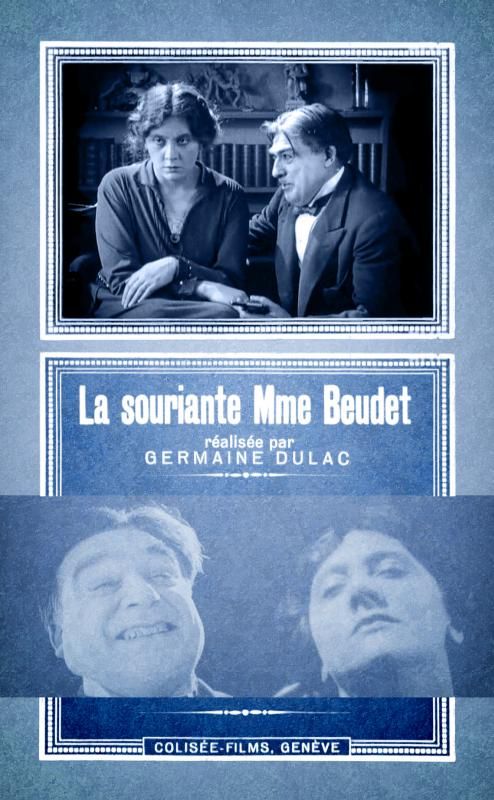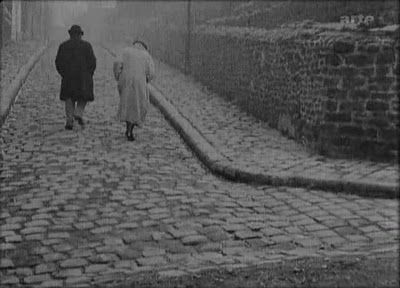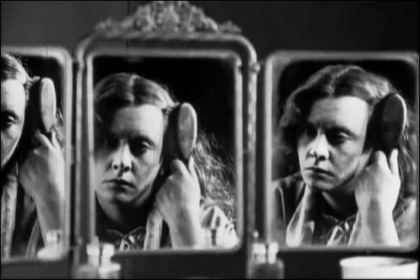The
Smiling Madame Beudet
1923
Director: Germaine Dulac
Starring: Germaine Dermoz, Alexandre
Arquillière
There
are certainly several early silent films that still feel potent and
entertaining today, but the majority of them don’t. They drag, they’re clearly outdated, they
reek of academic interest only rather than entertainment value. The Smiling Madame Beudet is not
what I would call “entertaining,” but I do think it is interesting from a
historical perspective and, surprisingly, I connected with the film on a bit of
an emotional level.
Mme.
Beudet (Dermoz) is unhappy. Seriously
unhappy. (yeah, she doesn’t really smile
much… or ever…) Her husband
(Arquillière) is a boar who flails about and mocks her silent moodiness, and
she hates him for it. He often play-acts
at committing suicide with the empty handgun he keeps in his desk drawer as a
way to get some reaction out of her. One
night, desperate in her all-consuming emptiness, she loads a single bullet into
the gun, seeing her only way out as this way.
The
biggest thing mentioned in regards to The Smiling Madame Beudet is that it
is possibly the first example of feminist filmmaking. I am not in a position to say if it is
definitively the first or not, but I respond to the fact that this film was
made by a woman about a woman.
Filmmaking is still primarily a man’s game; given that the 1920s was
kind of a big deal for women’s rights, it’s interesting to see a woman in this
time period delve into artistic expression.
Having
said that, I don’t read this movie completely in the way that it is most often described:
that Madame Beudet is frustrated by her misogynistic husband and loveless
marriage and desperately tries to find a way out the only way that she, as a
woman, can. Instead, when I saw this
again, I see it as a film about mental illness.
Madame Beudet is depressed.
Seriously depressed. In fact, I
see this film as an incredibly artistic expression of what it is to be
depressed. Why is Madame Beudet
depressed? Who knows? Depression has many causes, and can cause the
sufferer to act out in a myriad of ways.
She loses interest in activities that are of interest to her normally
(refusing the theater tickets), becomes withdrawn from those around her
(pretending to go back to sleep when she realizes her husband is still home),
and is overcome with feelings of sadness and guilt (pretty much every scene in the
film). Is her depression caused by her
marriage? Possibly. In any case, her husband isn’t much help
because he cannot “see” her illness and he undoubtedly doesn’t understand why
she feels so sad, which probably only makes her feel guilty for not being able
to fully understand why she feels the way she does. I say all of this because frankly, I’ve
battled depression in the past, and by saying so, I am opening up in an
intensely personal way to those who read this entry. Depression is frustrating to say the
least. I have a very loving husband, one
whom I love very much, but when I get hit with a bout of depression, I just
want to completely withdraw from absolutely everything, including him. And that’s where, in a way, I identify with
Madame Beudet. Because her husband is,
surprisingly, revealed to not be the oaf he is depicted as at the beginning of
the film. In fact, because of this very
fact, the film is far more emotionally subtle than many other silent
films. There are shades of grey here about
who is “right” and who is “wrong,” who is “evil” and who is “good.” I don’t think either main character is our
hero or villain. Rather, I view this as
a snapshot of the effect that an “invisible” mental illness, like depression,
can have on a marriage. Is this me
reading my personal experience into a film?
Undoubtedly, but isn’t that the point of art?
The
photography is interesting in The Smiling Madame Beudet. There are several in-camera effects, even
special effects, and the lighting was clearly thought about carefully. This was not simply a “point and shoot” film;
thought went into the artistic expression of each scene in terms of what or
whom was highlighted.
But
does this make The Smiling Madame Beudet an entertaining film? Not really.
My attention started to wander a little at the 20 minute mark – and the
version I saw was just under 40 minutes.
I don’t think this film has much interest outside an audience interested
in film history. Again, though, I
reiterate that I found this film not so much a story of female repression, but
one of depression and its difficult effects on everyone involved.
Arbitrary
Rating: 6/10



You are not alone in having struggled with depression. Count me in.
ReplyDeleteThanks for the comment and the show of solidarity. :)
DeleteThat is a very interesting angle and one I did not think of. It bothered me that the film tries to portray an evil husband who in my point of view is only trying to help his wife. If you assume that she is mentally ill and we see the story from her distorted view it makes a lot more sense. He is unable to cope with her, but so would almost anybody. Depression is not an easy illness to combat. Been there, done that.
ReplyDeleteIf on the other hand "Madame Beudet..." was made to promote a femististic cause I think it misses the mark.
I definitely agree that the husband is not really "evil." He IS trying to help, but he doesn't really know HOW to help. His intentions are good, however, despite their consequences not always being what he intended. I don't completely get behind the feminist interpretation either, mostly because when I watched this a second time, depression made so much more sense than a vague frustration at "a woman's place." I'm glad to offer an "alternative interpretation" for this one.
DeleteI'm with Mr. Sorensen on this one--yes, her husband is boorish, but he genuinely seems to want to do nice things for her. I never considered the depression angle, either, and I wish I had. It might have made me appreciate it a little more. When I watched it, I found my mind wandering. When I could actually concentrate on it, I kept wondering what her problem was. Maybe a little communication with her husband would've helped? I got the impression that he'd have done what she asked of him.
ReplyDeleteI found this one a struggle despite its length.
I don't know if I was struggling, per se, but it also wasn't an easy watch. At under an hour in length, it sure as heck felt longer. There were definitely times where I felt like I was playing the countdown game.
Deletemy sources replica ysl visit replica gucci click this site louis vuitton replica
ReplyDeletegolden goose
ReplyDeletekyrie irving shoes
yeezy shoes
fear of god hoodie
golden goose
kd shoes
fear of god essentials hoodie
supreme clothing
off white
nike sb dunks
duuiixaang985k
ReplyDeletegolden goose outlet
golden goose outlet
golden goose outlet
golden goose outlet
golden goose outlet
golden goose outlet
golden goose outlet
golden goose outlet
golden goose outlet
golden goose outlet